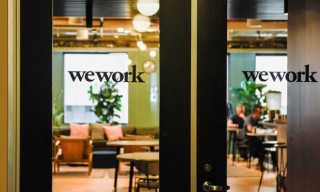Loading
Search
▼ Wework Boss To Walk Away With $1.7bn After Softbank Rescue Deal
- Category:Other
Payout comes as US office-sharing firm weighs up sacking 2,000 people as biggest investor SoftBank takes control
WeWork’s co-founder Adam Neumann is in line for a $1.7bn (£1.3bn) payout as investors seize control of the troubled office rentals empire he co-founded and thousands of employees wait to hear if they will lose their jobs.
Neumann, 40, used to describe WeWork as “largest physical social network in the world” and a company so important it would one day solve the problem of orphaned children.
Now his business – once the US’s most valuable private company – is in crisis. And the only winner appears to be Neumann, who is reportedly stepping back from the corporate crisis he created with a lucrative deal that will hand him $1bn from the sale of his shares plus a $185m “consultancy fee” and a $500m line of credit.
Under the terms of a rescue deal first reported by The Wall Street Journal, SoftBank, the Japanese investment firm that is WeWork’s largest shareholder, will now take control of the company.
The bailout deal will once again slash the valuation of the company. Once valued at as much as $65bn, WeWork is now thought to be worth $8bn – less than the $10bn SoftBank had invested in the company before the rescue package. It is an investment that has tarnished the reputation of one of the world’s biggest tech investors.
The payout to Neumann comes as WeWork weighs up sacking about 2,000 people. The redundancies are on hold while WeWork refinances but are expected soon and have triggered widespread bitterness among WeWork’s 15,000 employees. Many had expected to become millionaires when the company floated but now face losing their jobs. WeWork did not immediately return calls for comment.
Neumann, whose previous business ventures included a business selling women’s shoes with collapsible high heels and baby romper suits with reinforced knees, started his office rentals company in 2008 as an “eco-friendly co-working space” in Brooklyn, New York, with co-founder Miguel McKelvey.
As a new generation of tech entrepreneurs looked for office space, the company grew rapidly, financed by SoftBank and other blue chip Wall Street investors including Goldman Sachs and JP Morgan Chase.
By the end of June this year, WeWork had grown to a business with 528 locations worldwide with 527,000 tenants – or “members” as WeWork calls them.
For Neumann, We – as the company is known – was a trailblazer for a new era.
“The 90s and early 2000s were the ‘I’ decade,” Neumann told The Daily News back in 2011. “The iPhone, the iPod — everything was about me. Look where that got us? In a terrible recession. The next decade is the ‘We’ decade, where collaboration is the future of innovation.”
The firm takes long-term leases on office buildings, then adds the WeWork aesthetic, such as beer taps on each floor, skateboard ramps, communal areas, a jungle of potted plants and a party atmosphere. It then rents the spaces out on a short-term basis. The company is the largest private sector tenant in both London and New York, and rents space to businesses varying from single freelancers to corporations such as HSBC.
The last time SoftBank injected money into the business, it was valued at $47bn, despite vast losses that have totalled $3bn in the last three years. Earlier this year some bankers predicted WeWork could be worth as much as $65bn, which would have valued Neumann’s stakeat $14bn.
However, after the publication of the share sale prospectus already sceptical investors began to question We’s business model, its huge losses and Neumann’s sometimes eccentric behaviour.
Apart from his belief that WeWork could “solve the problem of children without parents”, Neumann has mused that he could one day become immortal, expand his business into communal living spaces and schools, and become the world’s first trillionaire.
WeWork’s co-founder Adam Neumann is in line for a $1.7bn (£1.3bn) payout as investors seize control of the troubled office rentals empire he co-founded and thousands of employees wait to hear if they will lose their jobs.
Neumann, 40, used to describe WeWork as “largest physical social network in the world” and a company so important it would one day solve the problem of orphaned children.
Now his business – once the US’s most valuable private company – is in crisis. And the only winner appears to be Neumann, who is reportedly stepping back from the corporate crisis he created with a lucrative deal that will hand him $1bn from the sale of his shares plus a $185m “consultancy fee” and a $500m line of credit.
Under the terms of a rescue deal first reported by The Wall Street Journal, SoftBank, the Japanese investment firm that is WeWork’s largest shareholder, will now take control of the company.
The bailout deal will once again slash the valuation of the company. Once valued at as much as $65bn, WeWork is now thought to be worth $8bn – less than the $10bn SoftBank had invested in the company before the rescue package. It is an investment that has tarnished the reputation of one of the world’s biggest tech investors.
The payout to Neumann comes as WeWork weighs up sacking about 2,000 people. The redundancies are on hold while WeWork refinances but are expected soon and have triggered widespread bitterness among WeWork’s 15,000 employees. Many had expected to become millionaires when the company floated but now face losing their jobs. WeWork did not immediately return calls for comment.
Neumann, whose previous business ventures included a business selling women’s shoes with collapsible high heels and baby romper suits with reinforced knees, started his office rentals company in 2008 as an “eco-friendly co-working space” in Brooklyn, New York, with co-founder Miguel McKelvey.
As a new generation of tech entrepreneurs looked for office space, the company grew rapidly, financed by SoftBank and other blue chip Wall Street investors including Goldman Sachs and JP Morgan Chase.
By the end of June this year, WeWork had grown to a business with 528 locations worldwide with 527,000 tenants – or “members” as WeWork calls them.
For Neumann, We – as the company is known – was a trailblazer for a new era.
“The 90s and early 2000s were the ‘I’ decade,” Neumann told The Daily News back in 2011. “The iPhone, the iPod — everything was about me. Look where that got us? In a terrible recession. The next decade is the ‘We’ decade, where collaboration is the future of innovation.”
The firm takes long-term leases on office buildings, then adds the WeWork aesthetic, such as beer taps on each floor, skateboard ramps, communal areas, a jungle of potted plants and a party atmosphere. It then rents the spaces out on a short-term basis. The company is the largest private sector tenant in both London and New York, and rents space to businesses varying from single freelancers to corporations such as HSBC.
The last time SoftBank injected money into the business, it was valued at $47bn, despite vast losses that have totalled $3bn in the last three years. Earlier this year some bankers predicted WeWork could be worth as much as $65bn, which would have valued Neumann’s stakeat $14bn.
However, after the publication of the share sale prospectus already sceptical investors began to question We’s business model, its huge losses and Neumann’s sometimes eccentric behaviour.
Apart from his belief that WeWork could “solve the problem of children without parents”, Neumann has mused that he could one day become immortal, expand his business into communal living spaces and schools, and become the world’s first trillionaire.
Neumann is married to Rebekah Paltrow Neumann, a former actor and cousin of Gwyneth Paltrow. Paltrow Neumann acted as her husband’s “strategic thought partner” and was instrumental in launching an ill-fated primary school, WeGrow, that offered daily Beatles sing-a-longs, meditation sessions and billed itself as a “conscious entrepreneurial school”. The Manhattan school, part of a planned chain and which charged up to $42,000 a year, will close this year.
Investors were scared off by losses of close to $700m in the first half of 2019, $1.6bn in 2018, almost $900m in 2017, and more than $400m in 2016. Neumann also intended to retain special voting shares which would have kept control of the company even after the share sale, and allowed him to dismiss dissident directors. Investors were also unimpressed by news that Neumann had cashed out $700m of his shares ahead of the sale.
The backlash led to the IPO’s cancellation and he stepped down as chief executive last month when it became clear the firm could run out of cash in November.
Under the terms of the rescue deal, Marcelo Claure, SoftBank’s chief operating officer, would become chairman. The Japanese conglomerate would end up owning 60% to 80% of WeWork under the proposal, which includes $5bn of new debt, as well as injecting $1.5bn in equity and an offer to buy up to $3bn of existing shares.
There is a rival funding package also on the table, from JP Morgan Chase, worth $5bn. That deal includes $2bn of unsecured debt. The board will decide on Tuesday which one to accept.
- October 23, 2019
- Comment (0)
- Trackback(0)



